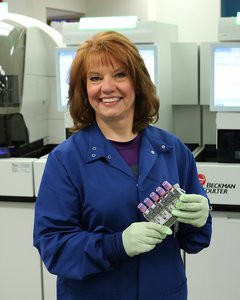Sepsis is a potentially life-threatening condition, but now the medical team at Sarah Bush Lincoln has the ability to anticipate the condition in people before it becomes more dangerous.
Through the use of a routine blood test, the Sarah Bush Lincoln Laboratory can help identify patients in the emergency department (ED) who have sepsis or are at increased risk of developing sepsis. It’s possible due to a new capability added to one of the lab’s testing analyzers. Sarah Bush Lincoln is one of the first hospitals in the region to adopt this early indicator technology to discern whether someone could potentially develop sepsis.
The analyzer evaluates the size and shape of blood cells and looks for sepsis markers in the blood that are reported as part of a complete blood count (CBC). Amy Pfeiffer, SBL Laboratory hematology specialist, explained, “This test measures the distribution of a certain class of cells. If an infection is present, it will show a larger increase of white cells, which equals a larger threat. Treatment can begin immediately.”
Sepsis is a potentially life-threatening condition caused by the body's response to an infection. The body normally releases chemicals into the bloodstream to fight an infection. Sepsis occurs when the body's response to these chemicals is out of balance, triggering changes that can damage multiple organ systems. If sepsis progresses to septic shock, blood pressure drops dramatically, and it could lead to death.
The timeliness of the test is so important because for every one hour of early intervention, there is a 7.6 percent per hour improvement in the outcome for the patient. Pfeiffer added that 1.7 million people die from septic shock each year. It is also the number one reason for rehospitalizations.
Pfeiffer shares her passion for early intervention with this test because 22 years ago, her father died of septic shock. “I saw the value of this technology both personally and professionally. When my father died, it was a life-shattering experience for me and my family. I felt that if there was technology out there that could save someone else’s loved one, then we need to do this,” she said. Pfeiffer was eager to implement the new technology for Sarah Bush Lincoln.
The ability for the SBL Lab to identify the sepsis marker will improve patient care. Pfeiffer added that because this is a new test, the FDA (Food and Drug Administration) allows it only to be used on a limited basis on people ages 18-89 in an ER setting. Early studies show it provides valuable and actionable information to clinicians when time is of the essence.
For more information on the sepsis indicator technology, please contact Pfeiffer in the SBL Lab at 271 258-2225.

